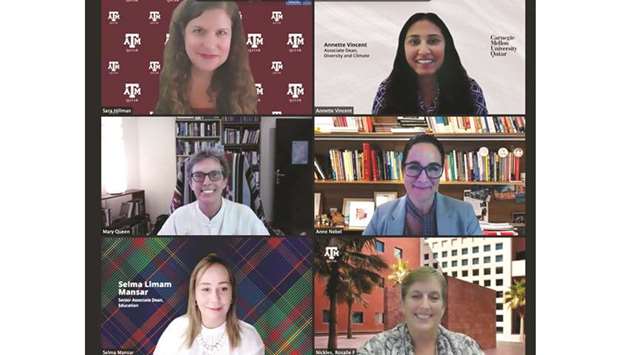The Women’s Faculty Forum at Texas A&M University at Qatar (Tamuq) recently brought together four female deans in Education City for the first time to share their experiences and advice for other women aspiring to be leaders, particularly in academia.
The virtual discussion featured Selma Limam Mansar, senior associate dean of education at Carnegie Mellon University in Qatar (CMUQ); Annette Vincent, associate dean of diversity and climate at CMUQ; Anne Nebel, associate dean for teaching, learning and assessment at Georgetown University in Qatar; and Rosalie Nickles, assistant dean for finance and administrative services at Tamuq.
Professors Sara Hillman and Mary Queen of Tamuq Liberal Arts Programme chaired and moderated the panel.
Each of these women is in their current positions because someone else encouraged them to be there - whether it was a colleague who supported them to go further, other deans or even childhood encouragement to pursue their leadership talents without male comparison.
Vincent said she credited “excellent mentorship, which helped her grow into her position and speak confidently,” while Nebel said she was “grateful to have worked with wonderful colleagues” who have made the process rewarding.
However, societal norms still hold women back from leadership positions around the world, the panellists noted. As Mansar described, perceptions of what is acceptable for a woman become “unconscious barriers against women.” When women are raised to believe their role in life is to be the primary caregiver, it is difficult to accept leadership positions and overcome feelings of guilt about the perceptions of abandoning the family.
Nickles, part of the first generation of women able to receive a college degree in the US, encouraged the next generation. “We are the people right now breaking those barriers and moving forward. We need to make sure we’re taking those opportunities afforded to us.”
Family and spousal support and agreement upon shared caregiver responsibilities are critical.
Additionally, they noted spousal positions need to be available when relocating female faculty members to Doha.
The panellists encouraged QF to open Education City universities for potential spousal hires to recruit more women. Universities can also promote professional development through leadership academies to help women become more comfortable in these positions and ultimately to grow into admirable leaders.
The panellists discussed the additional burden of Covid-19 on female faculty. For many faculty caregivers, the family’s expectation has increased, as the distinct line between work and home has disappeared and family members crave attention and direction. Many female faculty have had to assume the additional duty of school teacher at home and finding a balance is difficult for them.
The panellists encouraged women at all markers on this journey to leadership. Mansar suggested taking it one step at a time: “We can be leaders, but we don’t have to be deans right away. Don’t look at the end of the journey; look at what you’re doing now.”

The panellists at the event.
